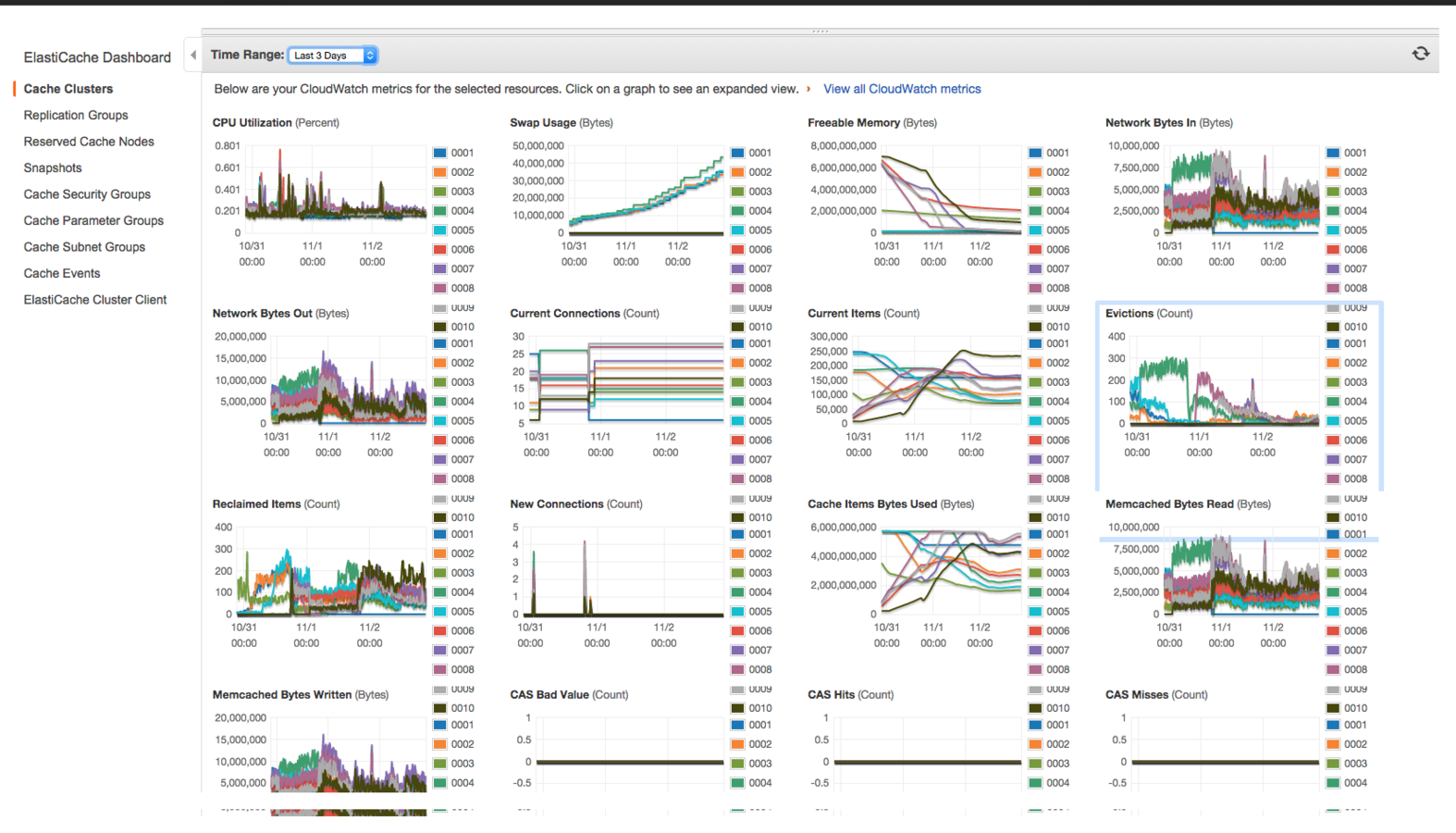Caching
priyatam mudivarti
principal engineer, architect
level money platform, capital one
half a billion
USER TRANSACTIONS
1 million downloads
iOS, Android, Web (on-boarding only)
8GB of daily Cache
a lot of data
32k Clojure LOC, ~1k Cljs LOC
3.5k Python LOC for tests
~400 million user transactions
Level App + platform
User transaction is a single amount (credit/debit) from your bank, credit card, etc.,

Programs exhibit spatial & temporal locality
application caches focus on
temporal locality
If you access data x at time t, you are likely to access data x at time t +/- delta
Cache
t1
tn
level
Naming
EviCtion
INVALIDATION
INVALIDATION
There must be a proper way to get informed that the information held by a cache needs to be discarded.
who do I tell?
Same user requests the same information multiple times, or multiple users request the same information.

EVICTION
How long do I exist?

Most algorithms you heard about are on evictions
DecoupLE them
EVICTION & INVALIDATION
why are they coupled?
Eviction may not exist without invalidation*
Invalidation has a property of being able to evict. It exists as a function of eviction
Memcache knows how to evict stale objects.
Let it do its job.
the question is not what time a function is called, but how invalidation requests are relative to time

*unless the cache runs out of memory
Naming
{cache-name}-{uid}-{cache-version}-{logical-timestamp}
auto-invalidation comes for free, whenever we bump the cache-version or logical-timestamps
immutable CACHE KEYS
{cache-name}-{uid}-{cache-version}-{logical-timestamp}
Naming
EviCtion
INVALIDATION
local.cache
remote.cache
generational.cache
Level
Chapters
Application cache
Level appliction cache is a distributed generational cache, built on Memcached and core.cache
Name - description of what we’re caching
Dependencies: Other caches it relies on (hierarchical)
Compute - a function invoked to fill the cache.
Serialize/deserialize fns - you know what this means
Version - increments when “compute” semantics change: to prevent reading data computed by the old function
LEVEL Cache
(def level-cache
{:name "suggested-new-funds"
:version 7
:dependencies #{:suggested-budget-update}
:compute (fn [uid now computed]
(bf/make
bf/funds-holder
{:funds (filter (complement :fund-id)
(:funds (:suggested-budget-update computed)))}))
:serialize bf/pb->bytebuffer
:deserialize #(bf/decode bf/funds-holder %)})
Users' transactions
Funds
Predicted transactions
Balance projection (derived from predicted transactions)
Suggested funds & buckets (pattern detection)
Buckets, including matched transactions
Budgets, synthetic blobs like Funds & Spendable
OUR ApplicAtion CAche
texans
base funds
monthly texans
projection
all funds
suggested budget update
insights
texans
projection
transactions
projection
balance
projection
suggested new
funds
budget
snaphot
suggested funds
LEVEL Cache - Dependencies
(def cache-order [:base-funds
:raw-insight-rows
:stripped-texans
:multi-month-texans-projection
:texans-projection
:transactions-projection
:full-funds
:balance-projection
:suggested-budget-update
:suggested-funds
:suggested-new-funds
:insights
:cards
:budget-snapshot])Dependency graph is a DAG—an ordered list.
No branches.
(def cache-order [:full-funds
:balance-projection
:suggested-budget-update
:suggested-funds
:suggested-new-funds
:insights
:cards
:budget-snapshot])Invalidate full funds?
Invalidation is simple: invalidate rest
Hierarchical cache.
Caches can have as many dependencies as you want
Pass current transactions to predict their future transactions. Make the future transactions cache depend on the current transactions one - conceptually it queries that cache
Dependency Loops are a compile-time error
On dependencies
(defn validate
"Validates cache config and dependencies."
[cachez]
(when-not (= (set cache-order) (set (keys cachez)))
(throw (Exception. (str "Inconsistent cache config: " cache-order " and " (keys cachez)))))
(doseq [cache-name cache-order]
(doseq [dependency (:dependencies (cachez cache-name))]
(when-not (cachez dependency)
(throw (Exception. (str "Inconsistent cache config: Unrecognized dependency "
dependency " for " cache-name))))
(when-not (> (cache-offsets cache-name) (cache-offsets dependency))
(throw (Exception. (str "Dependency " dependency " is calculated
after dependent cache" cache-name)))))))
@platform
#dynamo
LEVEL CachE
cache logic
API
Queues
query returns nil? recompute
incrementing the timestamp means there won’t be anything in Memcache with that name, so we’ll get a cache miss
queues ensure cache is "filled", invalidate every 24 hrs
atomically query the logical timestamps
logical timestamps start at 1, get atomically incremented to invalidate the cache
An immutable key tied to how values in the cache are produced.
{cache-name}-{uid}-{cache-version}-{logical-timestamp}
prevents race conditions, maybe
A Queue-backed service gets a message whenever we invalidate the cache, and refills the cache
Each key also is associated with a “generation” (“user-logical-timestamps” ). To invalidate we simply increment the cache generation. Anyone still using an old generation still has access to it.
RACE CONDITIONS
@platform
#dynamo
#memcache
REMOTE Cache (memcache)
API
Queues
cache logic
cache component
Memcache LRU eviction strategy removes invalid data or TTL after 24 hrs kicks in
delegate to
Gzip + Protocol Buffers
atomically query the logical timestamps
Often caches don't know how often they’re full
A Queue-backed service gets a message whenever we invalidate the cache, and refills the cache
New transactions coming in (including pending) will result in the transactions cache being invalidated, then queried, so it ends up full
When is it full?
If they are slow and being called from the API
Don't add if they’re only called occasionally from the backend, as we’ll be wasting CPU cycles keeping the cache filled
When should I add?
Serialization and deserialization is slow
MEM CACHE - Problems
Gzipping 1MB payload takes 100ms
Nippy is faster, but still ...
Core cache
CacheProtocol
Nice implementations of common (and uncommon) eviction strategies: FIFO, TTL, LRU, LIRS
Many implementations by third party libraries, including Spycache clojure lib.
Composable
(defprotocol CacheProtocol
"This is the protocol describing the basic cache capability."
(lookup [cache e]
[cache e not-found]
"Retrieve the value associated with `e` if it exists, else `nil` in
the 2-arg case. Retrieve the value associated with `e` if it exists,
else `not-found` in the 3-arg case.")
(has? [cache e]
"Checks if the cache contains a value associated with `e`")
(hit [cache e]
"Is meant to be called if the cache is determined to contain a value
associated with `e`")
(miss [cache e ret]
"Is meant to be called if the cache is determined to **not** contain a
value associated with `e`")
(evict [cache e]
"Removes an entry from the cache")
(seed [cache base]
"Is used to signal that the cache should be created with a seed.
The contract is that said cache should return an instance of its
own type."))@platform
#dynamo
#memcache
Local Cache (Core.Cache)
API
Queues
cache logic
cache component
core
cache
Write-through/Read-through
Delays
memoize DONE RIGHT
http://kotka.de/blog/2010/03/memoize_done_right.html
Clojure does not provide ready-made solutions, but it provides a lot of tools. The art is to combine them correctly. And when you are done, you end up with something small and elegant.
— Meikel Brandmeyer
public Delay(IFn fn){
this.fn = fn;
this.val = null;
this.exception = null;
}
synchronized public Object deref() {
if(fn != null) {
try {
val = fn.invoke();
}
catch(Throwable t) {
exception = t;
}
fn = null;
}
if(exception != null)
throw Util.sneakyThrow(exception);
return val;
}
Delay => Future => Promise
delay is guaranteed to run only once, and caches the results the remaining times
(ns cache.core)
(defn query-cache
"Top level query api for application access."
[uid timestamp tz cache-name params]
(if-let [cache (caches cache-name)]
(let [logical-ts (core/get-user-logical-timestamps cache-name uid)
base-key [cache-name uid (:version cache) params logical-ts]
query-dag (fn [dep-name]
(let [default-params (:default-params (caches dep-name))]
[dep-name (query-cache dep-name
uid
timestamp
tz
(default-params uid timestamp))])) gencache! (swap! cache-component/instance
cache-component/query-through base-key delayed-val!
(:serialize cache)
(:deserialize cache))] delayed-val! (delay
(let [deps (into {} (map query-dag (:dependencies cache)))]
(recalculate! cache-name uid params timestamp deps)))the atom's result holds a delayed value ... derefed elsewhere
@(:result gencache!))
(throw (Exception. (str "Querying unknown cache:" cache-name "for" uid)))))
delay recalculate! which calls the compute function of given cache
get the logical timestamp and recursively compute deps and pass to others
return the swapped value in the atom
(let [memcache-delay (delay
(if-let [memcache-value (try (core/item->value
(core-cache/lookup memcache key)
deserialize-fn)
(catch Exception e nil))]
memcache-value(ns cache.component)
(def instance (atom nil))
(defn query-through
[{:keys [memcache localcache] :as gencache} base-key value-delay serialize-fn deserialize-fn]
(let [key (apply core/stringify-key base-key )]
(if-let [local-delay (core-cache/lookup localcache key)]
(merge gencache
{:localcache (core-cache/hit localcache key)
:result local-delay})) (merge gencache
{:localcache (core-cache/miss localcache key memcache-delay)
:result memcache-delay})))))
first, look at local cache, if found cach-hit ... put it in :result
(do
(core-cache/miss memcache key
(core/value->item @value-delay serialize-fn))
@value-delay)))]then, look at mem cache and return its delayed value
if not, cache-miss and deref delayed value
finally, return memcache delay
:result => memcache-delay => recompute value delay
delay the recalculcuation
@platform
#dynamo
#memcache
A genertion cache, with local and remote providers
API
Queues
cache logic
cache component
core
cache
One physical cache supports many logical caches
That queue shouldn’t back up—compute faster or provision more machines
Most caches don’t actually need to invalidate every day
Cache misses can be slow —profiling could help
Things to remember
Performance & Metrics
memcache
node
local
cache
local
cache
load balancer
~1-2 ms
~100x
Network latencies on PROD
local
cache
~3000x
median times
dynamo
Memcache uses consistent hashing, however ...

Watch your Dashboards
Metrics
simple wrappers in clojure
cache-component wraps metrics for each miss, hit, and query
timers can be logged via cache-component
p99
Clojure Performance
profile compute functions
understand clojure seqs are slow
try to sort first
make good use of rseq in filters
when in doubt, read the clojure source
(defn recent-bucketed? [tz new-card cards texan]
(first-filter #(and (recent-txn? tz % texan)
(= :bucketed-transactions (:card-type %))
(= (:bucket-ids (:bucketed-transactions %))
(:bucket-ids (:bucketed-transactions new-card)))
(every? (comp #{:legacy-insight :debit-insight :credit-insight}
:bucket-type)
(:buckets (meta new-card))))
cards))
(defn- recent-cards
"Optimized version of recent cards. Reverses the cards internally, and works
iff cards are ordered from oldest to newest."
[utz texan cards]
(take-while (partial recent-card? utz texan) (rseq cards)))
(defn recent-bucketed? [utz new-card cards texan]
(first-filter #(and (= :bucketed-transactions (:card-type %))
(= (:bucket-ids (:bucketed-transactions %))
(:bucket-ids (:bucketed-transactions new-card)))
(every? (comp #{:legacy-insight :debit-insight :credit-insight}
:bucket-type)
(:buckets (meta new-card))))
(recent-cards utz texan cards)))
;; create-cards is a reducer over all cards (of transactions)
;; create-cards => bundle-cards => recent-bucketed?
Protocol
it's just a single function
(defprotocol GenCache
(query [uid timestamp timezone cache-name]
"For a given user id, at a given instant, query a cache-name"))
Hello, again
3 files
~600 lines
1 protocol
decoupled compute, serialize, deserialize
component with local and remote providers
generational cache
Adding a new cache entry takes a few hours ... less than a day
The future
Expand DAG with Component pattern
Each cache is a component
Compose Caches
Optimize Load Balancer — Load Cache
Async computation?
Dave Fayram
Gregor Stocks
Gregory Sizemore
Jeff Shecter
Jonathan Polin
Noodles
Priyatam Mudivarti
Director, Chief Architect
Backend Lead
Senior Performance Engineer
Data Science Lead
Software engineer
Github PR Reviewer*
Principal Engineer, Architect
Thanks!
- Level Money Platform

Big thanks to ...
References
- http://kotka.de/blog/2010/03/memoize_done_right.html
- https://github.com/clojure/core.cache
- https://www.adayinthelifeof.nl/2011/02/06/memcache-internals/
- https://www.mikeperham.com/2009/01/14/consistent-hashing-in-memcache-client/-
- https://github.com/memcached/memcached/blob/master/doc/protocol.txt
https://slides.com/priyatam/caching-half-a-billion-user-txns
Caching half a billion user transactions
By Priyatam Mudivarti
Caching half a billion user transactions
While many robust Cache libraries exists, understanding cache invalidation and eviction in a distributed platform requires a deeper understanding of your data access patterns. At Level Money we built our own caching solution, backed by a Memcached Farm. In this talk I will share our story: how we name and version our caches, grow dependency graphs, find expensive computations, avoid race conditions, and define compute functions to serialize financial data using a simple Protocol.
- 1,232



